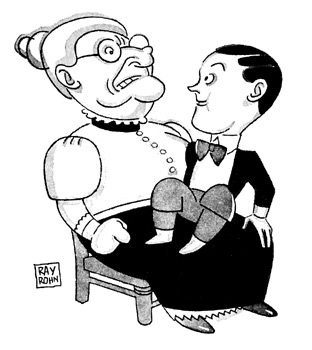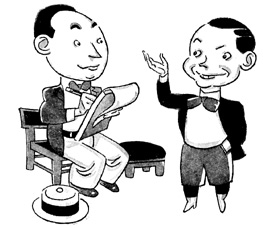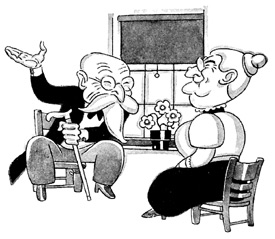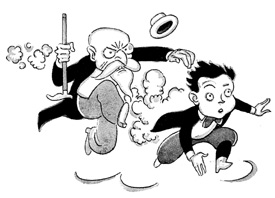| ||
| ||
from College Humor
Say Wen
by Ellis Parker ButlerAnd what marvelous thought have you been having now, may I ask, President Tillen?" I asked him because, as a matter of fact, our dear president is always having marvelous thoughts, most of which are -- well, for all his eighty-two years, forty of which he has spent as President of Dallings College, he is still an enthusiast.

"Danis Barst!" cried President Tillen, looking, no doubt, to see me jump up and shout for joy.
"What?" I asked, for in his moments of enthusiasm President Tillen sometimes utters phrases of Sanskrit or Urdu or Aramaic, languages with which he is familiar but with which I am not.
"Danis Barst!" he exclaimed again. "My dear, dear Dean Dean, don't say you do not know of Danis Barst!" (My name is Adella Dean.)
"Is it a new breakfast food?" I asked him.
"The infant prodigy, my dear Dean Dean," he said. "The mathematical-geometrical-algebraic infant phenomenon. The eight-year-old boy who is one of the twelve human beings who understands the Einstein Theory. The child who, given a problem in differential calculus that would have taken our late poor dear Professor Wurtzburgzinn a week to solve, gives the solution in three seconds," said President Tillen.
"Yes, yes," I said, for I remembered the details quite well now. "If thirty-six numbers, each of nine figures, are written on a blackboard, the young man -- aged eight, as you say -- gives the sum total, the total of all the numbers multiplied together, the square root of each, the square and cube root of the total and the greatest common denominator of all, and gives it the instant the last figure is chalked on the board."
"For our chair of Higher Mathematics!" exclaimed President Tillen, rubbing his hands together gleefully.
"But," I exclaimed aghast, "a child of eight?"
"Youth!" cried the President. "Youth, my dear Dean Dean! Isn't that what they want today? Isn't that --" He actually giggled. He got up and closed the door of my office and I allowed him to do so, although I have made it a rule never to allow that door to be closed when a male is in the room with me alone. I am -- and I am not ashamed to admit it -- sixty-nine years old, but a woman cannot be too careful. People talk.
"Dean Dean," he said, more seriously, "you have surely observed that the board has dropped hints of late. I have observed it. At the last meeting Buntemeyer said, as if off-hand, 'Some folks are not as young as they once were.' Do you remember what Joseph Wilk said at the meeting before that? 'Old trees give the most shade but when an umbrella gets as old as Methuselah, it isn't worth much.' And at the meeting before that, Ransom Differhinge looked directly at me and said, 'What we'll need in this college before long won't be chairs but mummy cases.' I think those remarks were, ah, invidious."

I remembered that several of the board had recently addressed me as grandma, although I certainly have no grandchildren. I remembered the youthfulness of deans and presidents lately placed in charge of colleges.
"I understand you, President Tillen," I said.
"Think of the enthusiasm of the board if I propose Danis Barst for the chair of Higher Mathematics!" cried President Tillen. "Youth! Dallings College in the forefront of America! Think of the advertising the dear members of the board will see in the appointment: 'Youngest College Professor in the World -- Eight-Year-Old Takes Chair of Higher Mathematics at Dallings -- Danis Barst Appointed.' They will," he said with his innocent smile, "forget how old we are for awhile, dear Dean Dean."
"We ought to be able to hang on for another year, at least, dear President Tillen," I said.
"And the uncle of Danis Barst is Endrow Fullert, the corn cure billionaire. If I can wangle a million dollar endowment out of him --"
"And, I remember," I said, "that Danis Barst is not a -- how shall I say it? -- petrified, may I say, specimen."
"I have a letter here from Orson Plantagenet Wall," said President Tillen. "He says: 'With all his miraculous mathematical phenomenality, Danis Barst is unspoiled. In mathematics he is a million years old; in all else he is real boy. Foremost among the mathematicians of all ages by some strange gift, he is -- when not mathematizing -- not highbrow, not a puny weakling all run to brain, but a healthy, hearty American boy.'"
"President Tillen," I said firmly, "we must have him!"
The board, I need hardly say, was delighted. When President Tillen, hemming and hawing as a president should before his board, "ventured" to make "with all diffidence" the suggestion, there was for a moment a period of almost stupefaction. The thought was almost too amazing.
"And Endrow Fullert is his uncle," said P. L. Coggerty in a whisper. "His income tax for 1929 was one million, six hundred and twenty-seven thousand, four hundred and twenty-two dollars and twenty-eight cents."
"I make the suggestion, of course, only with a view to bettering the educational facilities of Dallings College," said President Tillen.

At the beginning of the second semester Danis Barst came to Dallings to fill the chair of higher mathematics made vacant by the sad death of our dear late Professor Wurtzburgzinn.
I must say that, as he entered my office for the first time to make my acquaintance, Professor Barst made a most favorable impression on me. In spite of all that had been said and written I feared he would be a sickly child, but he was not at all that. He had the blooming health of youth.
"Professor Barst," I said, "I am pleased, as we all are, to welcome you to Dallings College. To add to our faculty one whose name is already internationally known is no small satisfaction to us. What do you think of our college, as far as you have seen it?"
"A bum dump. What's that thing by your nose?"
"A wen -- a small wen," I said hastily. "Has President Tillen --"
"What do you have it there for?" Professor Barst asked. "Was it always there?"
"No, dear," I said, for, after all, he was only a boy when he was not exercising his amazing mathematical mind. "It grew there."
"It's almost as big as your nose, ain't it?" the professor said. "It looks like another nose growing on you, don't it? Does it hurt?"
"No, it doesn't hurt," I said, a little sharply, I fear.
"If it gets any bigger, you can't tell which is your nose, can you?" he asked. "You won't know which to put your glasses on, will you?"
"I'll show you Hiddings Hall next, Professor," said President Tillen quickly.
"I don't want to see any old halls," Professor Barst protested. "I want to stay here and see this woman's wen grow."
"Young man," said President Tillen sternly, "will you come with me and see Hiddings Hall or will I take you across my knee and teach you a lesson in obedience to the president of this college, that you seem to need very much?"
I cannot deny that when Professor Danis Barst chose to give his classes proper attention he was excellent. At mathematics of any sort he probably led the world, but even before the Danhoff-Brisling affair brought matters to a climax the professor was, as President Tillen freely admitted to me, almost more than we could cope with. I am willing to say now that I do not believe that children under ten are desirable as college professors. Eight is too young and, if I could have my way, only the steadier sort of prodigies under twelve would be given professorships.
It seemed almost impossible to drive Professor Barst away from my office. He would come in and sit on my lap and stare at me as if fascinated. I assure you that I am not an unduly formal woman, but I consider it decidedly undignified for a dean of a co-educational college to hold a Professor of Higher Mathematics on her lap.
"You must bear the embarrassment for dear old Dallings, dear Dean Dean," Professor Scoggins said. "Perhaps during the summer vacation you can have the -- ah -- have it removed."
"During the summer vacation," I said with spirit, "I know very well I shall have it removed. That or Professor Barst."
"Oh! We must not lose Professor Barst!" President Tillen cried. The youngest professor! The worldwide fame of Dallings College! Tut-tut! No, no!"
The time came, however, when the newspapers contained the item, "In order to devote his time to a deeper study of the Einstein Theory in which he is deeply interested, Professor Danis Barst, who has been occupying the chair of higher Mathematics at Dallings College, has tendered his resignation which has been accepted with the deepest regret."
I need hardly say that the above paragraph hardly states the facts as they were. The Danhoff-Brisling affair was a little more than even Dallings College could stomach.
Next to his attachment for me, if not even greater, was the affection for Myra Brisling that Professor Barst developed almost the first time he met her. All the girls made a pet of him, but he chose Myra Brisling as the one he liked best and, whenever he could be, he was with her. She was a senior, a tall, noble-minded girl and as seriously inclined as I have ever known a girl to be. She was a leader in all the best organizations at Dallings, and it had been her intention to become a missionary until she felt drawn to Professor Danhoff by the gentle urgings of love. Perhaps there was a motherly urge, too. It would have been pleasant -- if he had not been such an imp -- to see, as I often did, Professor Barst hippety-hopping at her side as they crossed the campus, his hand in hers while he chattered childishly, saying, "When I get home my papa is going to let me have a pony, Myra," or "But, in my opinion, Myra, the deviation of light from the straight line can be equal only to the cube of the norm divided by the square of the atomic difference between the sum of two electrons weighed in ether," or "Please, Myra, come and get an ice-cream cone now, won't you, Myra? Please Myra!"
The first indication I had that a childish jealousy of Professor Danhoff lurked in Professor Barst's heart was when he asked me a question.
"Wally," (he had begun to call me Wally as shorter than Walrus, when he did not call me Granny Dean) "why does Myra like old Monkeydoodle Danhoff?"
I may explain that Professor Barst disliked Professor Danhoff bitterly. In his work as Professor of Applied Biology, in which field he was indeed eminent, Professor Danhoff was then making extensive experiments in search of the cause of the derri-derri disease which was then raging in the monkey section of South America. The disease is most deadly to human beings, and Professor Danhoff held the theory that while not deadly to monkeys, it was communicated by them. He was attempting to discover just what the symptoms of derri-derri were in monkeys, and he had a cage of eight of the little animals he had sent him from Brazil. Each of these he had inoculated with derri-derri virus.
"A bite, or even a scratch, from one off dose monkeys, it means sure death to anyvon," he told me. "You keep dot Brofessor Barst avay from dose monkeys! I varn you vunce!"
He had already "varned" Professor Barst himself, telling him he would skin him alive if he caught him near the monkey cages, which were in the attic of Blemmons Hall where Professor Danhoff had his rooms. This made Professor Barst quite angry. He was eager to be near the monkeys and to watch them and feed them bananas. To him they were monkeys and nothing more.
"Why does Myra like old Monkeydoodle Danhoff?" Professor Barst asked me. "Why does she, Granny Dean?"
"I'm sure I don't know, child," I answered, "unless it is on account of his clothes."
I was speaking sarcastically, for Professor Danhoff, although an excellent man, was often considered a disgrace to Dallings because of his garments. He was extremely careless about them, wearing a coat years after it deserved to be discarded.
"Oh!" said Professor Barst. I suppose he thought over what I had said; it seems so.
When she met Professor Danhoff and walked with him across the campus, Myra Brisling, whose pace was itself rapid, had to walk even more rapidly than usual, for he was always in a tremendous hurry. At such times, if she happened to be holding Professor Barst's hand, the child had to hippety-hop rapidly or even break into little running steps to keep up with Myra, and I suppose he listened eagerly to what they said.
"But, Adolf," Myra said one day on one of these cross campus walks, "why won't you come to the faculty dance with me tonight? Think what an honor it is for me to be invited. Won't you come with me?"
"No. I don't go by such dances, honey-sweet," he said. "Chust now I got me plenty work mit my monkeys and all."
"You never will dance with me," she said. "I don't believe you know how to dance, Adolf."
"Dance? I know how to dance better as all these young snipper-snappers. Yes! Now have I no time to dance. Some time I show you how I can dance, honey-sweet. Yes! You vill be surprised by your Adolf. Yes!"
"That is a promise, Adolf," Myra Brisling said. "I will hold you to it."
I suppose Professor Barst remembered that. At any rate it was one of those days we have just before graduation when Professor Barst let Professor Danhoff's monkey Number Three out of its cage, a sweltering hot day. The roof of Blemmon's Hall had just been tarred; in fact, it had been tarred the day before and the tar man's ladder stood on the second story roof as a means of reaching the third story roof. Probably Professor Barst planned nothing in advance; probably it all came to him at the moment -- mere innocent, childish playfulness, the little imp!
From my window in Administration I saw Professor Barst come from Hiddings Hall. He stood a moment or two on the steps, looking this way and that way as if wondering what a boy could do to amuse himself. He put his hands in his pockets and took out a piece of string and half a dozen marbles and put them back. From his left side coat pocket he took a paper covered copy of Hertl's Problems in Astronomic Calculation and sat on the steps and read awhile. Then he put the pamphlet back in his pocket and felt in his other side coat pocket. His hand found a banana there, and he was about to eat it when he happened to look up at Professor Danhoff's windows. It was probably the banana in his hand that suggested feeding the monkeys, and he got up from the step and walked the short distance to Blemmon's Hall and entered the door.
It seems that he went up the wide stairs and was on his way to the third floor attic when he heard a splashing and grunting and knew that Professor Danhoff was taking a bath. That was when it occurred to Professor Barst to get rid of the clothes of Professor Danhoff -- the clothes I had so sarcastically told him were the reason Myra Brisling loved Professor Danhoff. He tried Mr. Danhoff's door and found it open and went in.
I understand, from what I heard, that Professor Barst made a complete job of the clothes while he was about it. He threw them all out the window. He even opened the drawers of Professor Danhoff's dresser and threw out what was in them and emptied his closet of every garment. No doubt he meant to burn them when he went down.
On the campus the young ladies who were to carry the laurel-chain on Laurel Day were rehearsing. We had not yet taken the laurel chain out of cold storage -- where it is kept from year to year -- but the fifty young ladies were learning their distances and directions, using a long clothesline as a laurel chain, and they tell me they were surprised to see garments come tumbling from Professor Danhoff's window. As some of the more intimate garments fluttered down, the more modest young ladies lowered their eyes. Flora Graham, who was just behind Myra -- whose place was rightly at the head of the chain-bearers -- said to Myra: "Your professor seems to be cleaning house. Is he making room for his wedding trousseau, Myra?" To this Myra answered nothing, but she led the chain-bearers in the opposite direction. She was blushing, probably on account of some long red woolen garments that fell just then.
As the parade was headed away from Blemmons Hall, no one but myself saw what happened next. I saw Professor Barst back out the window onto the second story roof, with Professor Danhoff's derri-derri infected monkey Number Three following close behind him. I saw Professor Barst throw the banana up onto the third floor roof, and I saw, with my own eyes, the monkey scamper up the ladder after the banana. I saw Professor Barst climb in at the window.
It seems that he ran to the bathroom shouting: "Professor! Professor! One of your monkeys got out and is up on the roof!" It seems that Professor Danhoff leaped out of the tub and jumped for his clothes, uttering cries of anger and dismay, and that he found no clothes. No clothes whatever. I saw him start to climb out of the window onto the second story roof and then I turned my eyes away. Practically.
It seems that Professor Barst followed Professor Danhoff out the window and, as soon as Professor Danhoff had gone up the ladder, took the ladder down. It is true that a minute or so later Professor Barst was running across the campus toward Myra Brisling and shouting: "Myra! Myra! Look! Look! Old Monkeydoodle is dancing now! Look, Myra -- he's dancing now!"
Myra and the other forty-nine chain-bearers looked once and then turned and fled. I regret to say that Professor Danhoff had nothing on whatever except his spectacles. So I have been told. He was shouting madly and leaping up and down on the hot-tarred roof, skipping like a goat and hopping like a kangaroo. I understood this was partly to frighten the Number Three monkey back into the attic and partly because the roof was so hot.
In a moment all Dallings College seemed out upon the campus. Our bursar was on the second story roof putting up the ladder, everyone else was shouting advice, the chain-bearers were trying to revive Myra Brisling, and above all the noise the voice of Professor Danhoff could be heard uttering unseemly cries.

In the midst of this, President Tillen stepped out of the Administration Building with his cane in his hand. He looked at the crowded campus, cast his eyes up at the professor on the roof of Blemmons Hall and then saw Professor Barst, the youngest college professor in the world, gather up an armful of garments from under Professor Danhoff's windows. There are times when President Tillen is slow of thought, but he was not slow now. His brain connected the nude professor on a tarred roof with a pile of garments on the ground under that professor's window, and with Professor Barst who had an armful of them.
"You infernal little pest!" President Tillen shouted and raised his cane.
The last Dallings College saw of Barst of Dallings was when the infant prodigy went through the college gates one jump ahead of our dear professor, but others saw them a mile down the road, still in the same order. At every leap our dear president whacked at the late Professor of Higher Mathematics, sometimes missing him and sometimes not.
"I'll infant you! I'll progidy you! I'll Einstein you!" our president was shouting.
It was considered by all concerned a resignation of the chair of Higher Mathematics.
www.ellisparkerbutler.info
Saturday, October 07 at 6:42:47am USA Central